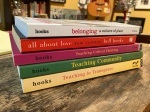Dirty Boots: Honoring bell hooks
 I’m reminded often of how badly we need public intellectuals like bell hooks, now more than ever. Though she passed away in 2021, bell hooks – whose given name was Gloria Watkins – left behind more than three dozen books and countless other expressions of her ideas, including dialogues and media appearances. In works like Feminism is for Everybody, Belonging, Teaching to Transgress, and All About Love, she articulated a vision of equality that could empower everyone and that anyone could relate to.
I’m reminded often of how badly we need public intellectuals like bell hooks, now more than ever. Though she passed away in 2021, bell hooks – whose given name was Gloria Watkins – left behind more than three dozen books and countless other expressions of her ideas, including dialogues and media appearances. In works like Feminism is for Everybody, Belonging, Teaching to Transgress, and All About Love, she articulated a vision of equality that could empower everyone and that anyone could relate to.
Consider an example from the opening chapter of her 1994 book Teaching to Transgress, titled “Engaged Pedagogy.” When I taught twelfth-grade English at an arts magnet school, I used to do a weeks-long unit on critical thinking, and “Engaged Pedagogy” was one of the readings that I handed out. Among the passages that I spent class time on was this one:
During my twenty years of teaching, I have witnessed a grave sense of dis-ease among professors (irrespective of their politics) when students want to see them as whole human beings with complex lives and experiences rather than simply as seekers of compartmentalized bits of knowledge.
bell hooks reminds readers that students need to see their teachers as human beings first and foremost, instead of as authority figures forcing “bits of knowledge” onto them. When this change is first permitted then actually does happen, the classroom becomes a more humane place, where learning can be a life-enhancing activity rather than drudgery or rule enforcement.
Or this brief sentence from the book Teaching Community: “There are serious taboos against acknowledging shame.” We’ve all done things that we wish we hadn’t done, and it’s uncomfortable to have those actions returned to our attention, or worse, held up for public scrutiny. So, what do we do? We suppress anything that could be embarrassing, refusing to deal with it. But sometimes facing it is what needs to happen for meaningful healing to be possible and for meaningful change to occur. We often avoid this, though, because fear and anxiety warn us that compassion will be absent and that forgiveness will be withheld. But what if they weren’t? What if we could enter the pain of facing our worst actions, knowing – because the lived experience of understanding and love had shown us – that, in doing so, we would clearly be moving toward salvation?
I could keep offering passages and quotes for consideration, but instead I’ll urge anyone who is willing to read at least one of her books. In them, a reader will find startling levels of compassion alongside intense moments that are challenging. In Belonging, she acknowledges the difficulty of being a modern black feminist whose rural Southern roots are difficult to reconcile. In All About Love, she parses the differences between a parent genuinely loving their children while doing things within the family that are not acts of love. In Teaching Critical Thinking, we read about her views that learning is a journey that teachers and students take together, a process that improves the lives of all involved. What is wonderful about her work is that, as any good teacher will, she offers us support and encouragement alongside difficult lessons that can help us to grow.
In honor of her birthday – today, September 25 – I wanted to share those few words and also recommend this 2024 episode of American Experience, “Becoming bell hooks.” Listening to her reminds us that every choice doesn’t have to be about deciding how we can win or succeed or decide whose side we’re on.
As a side note, if you really like bell hooks and have a good sense of humor, I highly recommend the Instagram account @savedbythebellhooks, which juxtaposes quotes from her work with the TV show Saved by the Bell.



